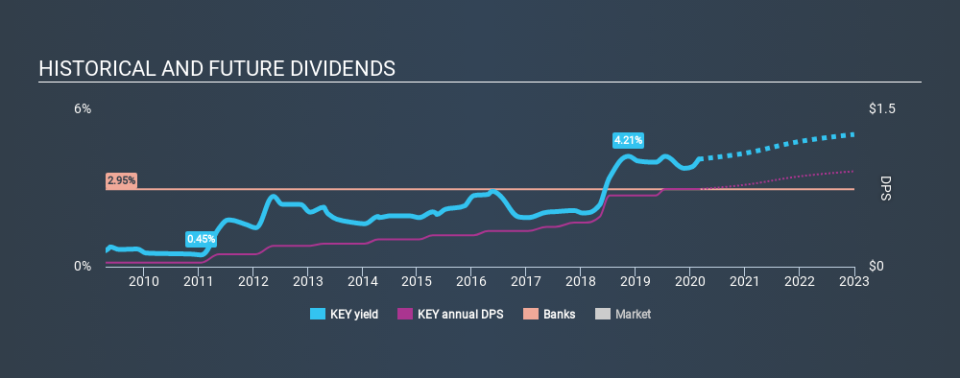Here's What We Like About KeyCorp (NYSE:KEY)'s Upcoming Dividend

Readers hoping to buy KeyCorp (NYSE:KEY) for its dividend will need to make their move shortly, as the stock is about to trade ex-dividend. You can purchase shares before the 2nd of March in order to receive the dividend, which the company will pay on the 13th of March.
KeyCorp's next dividend payment will be US$0.18 per share, and in the last 12 months, the company paid a total of US$0.74 per share. Calculating the last year's worth of payments shows that KeyCorp has a trailing yield of 4.1% on the current share price of $18.04. Dividends are an important source of income to many shareholders, but the health of the business is crucial to maintaining those dividends. So we need to investigate whether KeyCorp can afford its dividend, and if the dividend could grow.
Check out our latest analysis for KeyCorp
If a company pays out more in dividends than it earned, then the dividend might become unsustainable - hardly an ideal situation. KeyCorp paid out a comfortable 44% of its profit last year.
Companies that pay out less in dividends than they earn in profits generally have more sustainable dividends. The lower the payout ratio, the more wiggle room the business has before it could be forced to cut the dividend.
Click here to see the company's payout ratio, plus analyst estimates of its future dividends.
Have Earnings And Dividends Been Growing?
Businesses with strong growth prospects usually make the best dividend payers, because it's easier to grow dividends when earnings per share are improving. If earnings fall far enough, the company could be forced to cut its dividend. With that in mind, we're encouraged by the steady growth at KeyCorp, with earnings per share up 9.1% on average over the last five years.
Another key way to measure a company's dividend prospects is by measuring its historical rate of dividend growth. KeyCorp has delivered 34% dividend growth per year on average over the past ten years. We're glad to see dividends rising alongside earnings over a number of years, which may be a sign the company intends to share the growth with shareholders.
To Sum It Up
Has KeyCorp got what it takes to maintain its dividend payments? It has been growing its earnings per share somewhat in recent years, although it reinvests more than half its earnings in the business, which could suggest there are some growth projects that have not yet reached fruition. Overall, KeyCorp looks like a promising dividend stock in this analysis, and we think it would be worth investigating further.
Ever wonder what the future holds for KeyCorp? See what the 14 analysts we track are forecasting, with this visualisation of its historical and future estimated earnings and cash flow
A common investment mistake is buying the first interesting stock you see. Here you can find a list of promising dividend stocks with a greater than 2% yield and an upcoming dividend.
If you spot an error that warrants correction, please contact the editor at editorial-team@simplywallst.com. This article by Simply Wall St is general in nature. It does not constitute a recommendation to buy or sell any stock, and does not take account of your objectives, or your financial situation. Simply Wall St has no position in the stocks mentioned.
We aim to bring you long-term focused research analysis driven by fundamental data. Note that our analysis may not factor in the latest price-sensitive company announcements or qualitative material. Thank you for reading.

 Yahoo Finance
Yahoo Finance 
